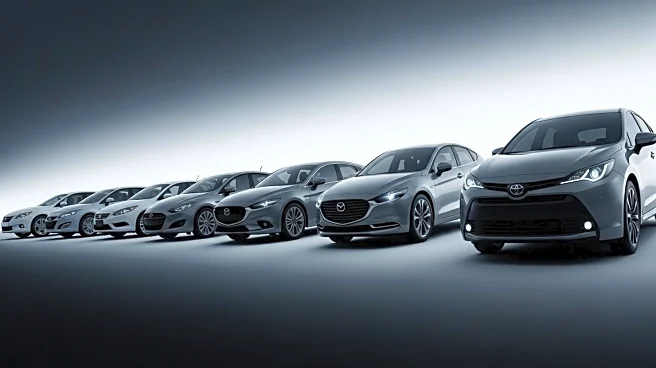What's Happening?
The National Highway Traffic Safety Administration (NHTSA) has announced a series of recalls affecting nearly 1.7 million vehicles from major automakers including Ford, Mazda, and Toyota. The recalls address various safety issues, such as faulty rearview cameras in over 1 million Ford vehicles, inaccurate fuel gauges in Mazda's CX-90 and CX-70 models, and inoperative defroster systems in Toyota and Subaru vehicles. Ford's recall involves models like the Ford Econoline, Edge, Expedition, and Mustang, among others, due to a defect in the rearview camera's printed circuit board. Mazda's recall is due to a chemical reaction affecting the fuel gauge's accuracy, while Toyota's recall involves a software issue affecting the defroster system. Remedies for these issues are under development, with notifications to be sent to vehicle owners in the coming months.
Why It's Important?
These recalls highlight significant safety concerns that could impact millions of drivers across the United States. Faulty rearview cameras and inaccurate fuel gauges pose direct safety risks, potentially leading to accidents or vehicle malfunctions. The recalls also underscore the importance of rigorous quality control and oversight in automotive manufacturing. For the affected automakers, these recalls could result in substantial financial costs and reputational damage. Consumers may face inconvenience and potential safety hazards until the issues are resolved. The recalls also emphasize the role of the NHTSA in ensuring vehicle safety and protecting consumers from defective automotive products.
What's Next?
Ford, Mazda, and Toyota are in the process of developing remedies for the identified issues. Ford plans to send initial recall notices by September 22, with follow-up communications once solutions are available. Mazda and Toyota have also outlined timelines for notifying affected vehicle owners and implementing corrective measures. As these automakers work to address the defects, they may face increased scrutiny from regulators and consumers. The recalls could prompt further investigations into manufacturing practices and quality assurance processes within the automotive industry.










